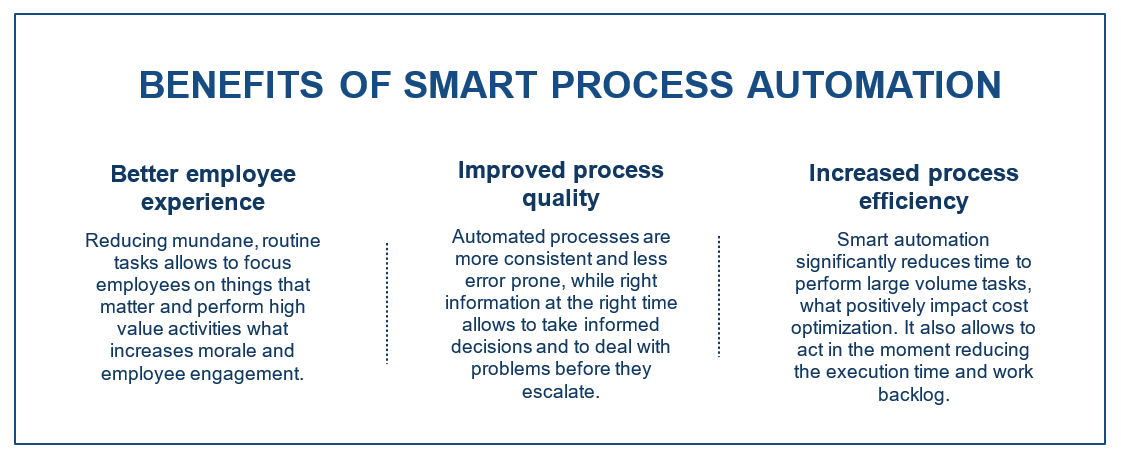
Take action when it matters with Smart Process Automation
Acting quickly and accurately has always been key to building and maintaining a successful organization. After a year of living with the pandemic we were taught that those capabilities were not only desired, but also essential for companies to survive under unpreceded disruptions. They helped companies to quickly adapt to new market conditions, customer requirements and new ways of working. Moving forward acting in the moment will allow organizations to accelerate their time to value and enhance many business aspects, especially:
- Improve customer experience – impatient customers appreciate having their products and services provided rapidly, without any delays
- Take informed decisions based on relevant real-time data – acting on information in the moment may significantly improve quality of processes
- Reduce financial and operational risks – by having access to relevant information immediately, it's easier to take appropriate action at the right time
Many companies, however, are still struggling to achieve have such capabilities. There are two main reasons behind it:
Fragmented environment: Majority of large, established organizations built their IT environment for years, usually through acquisitions and adding new functionalities, often without proper integration. Usually, they ended up with siloed and fragmented environment which does not support seamless data flows and process automation. In consequence many processes remain manual and, therefore, lengthy, error prone and highly inefficient.
Human factor: People have tendency to postpone boring, manual or difficult tasks. If they don't have the right tools that allow them to take an easy action in the moment and deal with the problem immediately, it may end up at the end of to do list and be delayed. This may bring serious consequences to the business, including financial losses.
For example, organizations dealing with many projects at the same time may have difficulties with verifying the ones that are profitable and those which need intervention. If the process is not smooth, a person evaluating projects that found an account with overdue payment, may find it difficult to run a necessary credit check. Especially, that doing so, may require switching systems, having relevant access rights and relevant training. Thus, often need to involve other employees, make a phone call, write an email, wait for the reply… the process may get complicated and incredibly long.
How can technology help?
The first step towards streamlining processes and making them more frictionless is data integration across organizational silos. Only then organizations will be able to get the full picture of operations and one source of truth – right information at the right time. These will also create a foundation for implementing smart process automation.
77% of European companies need to develop real-time DATA INTEGRATION to improve business resiliency
IDC European Software Survey, December 2020
Integrated systems offer the opportunity to leverage advanced analytics and machine learning to better understand what is happening within the whole organization. Such knowledge enables organizations to be more proactive. It allows not only to discover problems immediately, but also (using machine learning engine) can help interpreting them, provide possible solutions and give recommendations about next steps. This, in turn, enables to take appropriate action when it matters, what can bring number of benefits to the company.






